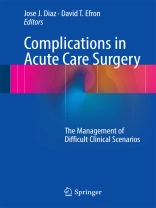This text provides the reader a starting point for the most difficult and uncommon complications in acute care surgery. It is designed to provide options to that ubiquitous intra-operative or bedside question “Well, now what do we do with this?” The topics have been chosen for the extreme difficulty of management and the surprising regularity that they present and the lack of large volume of accumulated evidence, where expert experience remains vital. The volume editors present a list of clinical scenario’s, intra-operative findings, and ethical circumstances that few general surgeons in their career will see in their career. The authors represent the most prolific surgeons in practice today. They present how they wound manage these challenging acute care surgery problems based on their vast clinical experience. Here, these surgeons share their personal experience with the most difficult cases. The text is divided into 4 parts. The first part is “Global Patient Issues” when asingular surgical problem presents itself in a very complicated patient with an extensive list of unstable co-morbid diseases. The second part is “Specific Disease Issues”. This is a surgical text and as such each issue is an unexpected intra-operative finding and expert management. The third part is “Post-Operative Issues” and as any seasoned surgeon knows, is the most critical part of managing a complicated surgical case. The last section is “Challenging Ethical Scenarios.” The text is designed to provide the surgeon in training or the seasoned general surgeon unique clinical or operative options for the care of their patients.
Table des matières
Challenging IV Access in the Patient with Septic Shock.- Fluids in Septic Shock: Crystalloid, Colloids, or Blood?.- Resuscitation of the Patient in Severe Septic Shock.- Intra-peritoneal Resuscitation in Trauma and Sepsis: Management Options for the Open Abdomen.- How to Feed the Open Abdomen.- Intra-Abdominal Hypertension and Abdominal Compartment Syndrome in Acute Care Surgery.- Empyema in the Acute Care Surgical Patient.- Gastric.- The Complicated Cholecystectomy and Management of Perforation Post-ERCP.- Acute Necrotizing Pancreatitis.- Small Bowel: The Problematic Duodenal Perforation.- Small Bowel: Aortoenteric Fistula.- Small Bowel: Pneumatosis Intestinalis.- Colon: Long Hartmann and Rectal Stump Blowout.- Rectum: Management of the Urgen APR & Dissecting the ‘Frozen’ Pelvis.- Complex Liver Abscess.- The Complex Splenectomy.- Soft Tissue Necrotizing Infection Due to Perforated Colon.- The Planning for the ‘Planned Ventral Hernia’.- Post-Bariatric Complications-Leaks.- The Problem Stoma.- The Immunosuppressed Patient.- Management of Anastomotic Leaks-Early <7 Days and Late >7 Days.- The Re-Laparotomy in the Delayed (2-3 week) Post-Operative Period.- The Management of the Entero-Atmospheric Fistula (EAF).- Unresectable Malignancy and Bowel Obstruction in the Acute Care Surgery Patient.- Jehovah’s Witness and the Bleeding Surgical Patient.
A propos de l’auteur
Jose J. Diaz, M.D.
Professor of Surgery
Chief, Division of Acute Care Surgery
Program Director, Acute Care Surgery Fellowship
Program in Trauma
R Adams Cowley Shock Trauma Center
University of Maryland School of Medicine
Baltimore, MD
David T. Efron, MD
Professor of Surgery, Anesthesiology and Critical Care Medicine, and Emergency Medicine
Chief, Division of Acute Care Surgery
Director of Adult Trauma
Department of Surgery
Johns Hopkins Hospital
The John Hopkins University School of Medicine
Baltimore, MD












